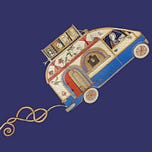The Almost-Empty Attic
As he climbed the back stairs, Roger McAllister noticed a thermostatically controlled ventilation fan, mounted above the rear attic window. From the model and trim of the fan, the very brand that McAllister himself recommended for some of his clients, those who insisted on keeping things in their attics, he guessed that it had been installed maybe six or seven years before, with professional workmanship. It didn’t seem like the kind of thing an old widowed professor would spend his CPP on. Well, thought McAllister, this family might not, after all, be wasting my time. Despite the small house in the ordinary neighborhood, this Jacob Josephson might turn out to have had a little cash.
The attic had been cleaned. There were no old clothes. No old furniture. No old toys. No stacks of boxes for the off-chance that someday, somebody might need to return an appliance to its manufacturer: none of the usual attic clutter through which McAllister so often found himself navigating. The simple oak flooring, recently mopped, extended from the back of the house to the front, clean lines of forty feet or so.
In the middle of this almost-empty attic there were dormer windows on either side, creating little alcoves. In the left-hand space, protected from the sun by closed wooden blinds, was the collection that McAllister had come to see: two cardboard boxes, three rough wood crates, a single tall bookshelf filled with titles in German, and an old blanket chest, very simple, the kind that could be pressed into service, if need be, as a coffin for a six-year-old child.
“This is what remains,” said the oldest sister, “of our grandfather’s bookstore.”
McAllister glanced over the books, then stooped down to look at one of the old wood crates. A faded ink stamp, barely legible: Konrad Josef Bücherregal, München. The old fellow had called his store a “bookshelf,” thought McAllister. How cozy.
“These were his favorite books,” said the second sister. “Or so we presume.”
“We haven’t read them,” said the youngest sister, the attractive one. “We don’t read German.”
“And in the boxes, the crates… the chest… ” said the youngest sister, “there are more books… and papers. Letters, we think. Correspondence.”
“None of us knew him,” said the second sister.
“He died here in Canada,” said the oldest. “I was born a week later.”
“We haven’t touched anything,” said the second sister. “We had the workmen set all this to one side when they were cleaning the attic. We told them to put the loose papers in boxes.”
“The workmen couldn’t read German either,” said the youngest sister. “We made sure.”
“You must give me their names,” said McAllister, holding her steady gaze. “These workmen who don’t read German.”
Then he looked down at the cardboard boxes. They were identical, with bold modern logos, easy to read without stooping.
“JKJ Graphics,” he said out loud.
“Oh, this attic was full of those boxes,” the oldest sister said. “Before the cleaning. Now they’re all in our houses. We’ll sort them out.”
“But JKJ… the initials…?” said McAllister. “Joseph Konrad Josephson?”
“And Jakob Konrad Josephson as well,” said the second sister. “Father and Grandfather had the same initials. Legally. Although Father never used his middle name.”
“He thought it sounded too… ” The youngest sister looked at McAllister. “You know. Aryan.”
“But, yes, the name of the business… ” said the oldest sister.
“We’ve talked about that,” said the second sister. “The three of us.”
“We think he wanted the connection to his father,” said the third sister.
Roger McAllister nodded, as if he were simply absorbing the details of family nomenclature. But behind his polite smile, his head was swimming with calculations, recalibrations, and self-recriminations. For he had just realized to whom he was speaking. These were not just any Josephsons; these were The Josephsons. The modest address had thrown him off his game. He had been treating these women like ordinary middle-class nobodies, when in fact his clients were the very Josephsons who had been so much in the news three years before, when they had sold JKJ Graphics, their family business, to a Swedish conglomerate. McAllister could remember the headline quite vividly: the sale price had been $980 million (USD).
One point four billion Canadian.
Next Episode: Hildebrand
For the impatient:
Buy ebook, audiobook on Amazon
Buy paperback on Lulu
Or just wait for the next episode…










